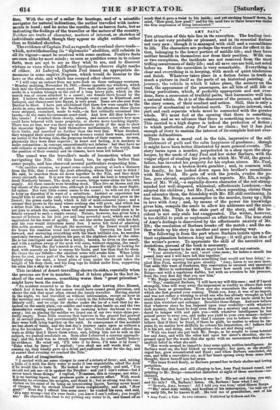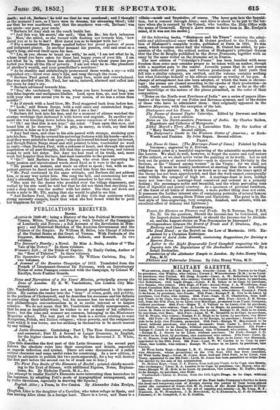ANY rAti...* THE attraction of this tale lies in its
execution. The leading inei. dent is not very probable or pleasant, and in its essential feature not very new ; though it is managed with skill and a resemblance to life. The characters are perhaps the worst class for effect in fic- tion, belonging to the lower portion of middle life ; and they have neither breadth in themselves nor from their position. With one or two exceptions, the incidents are not removed from the most trifling occurrences of daily life ; and all save one are told, not acted before us. But the execution is very remarkable. Everything is clear and everything is in keeping, with much of quiet tenderness and finish. Whatever takes place in a fiction forms in truth as much a picture in itself as the parts of an historical painting. A journey, the vehicle in which it takes place, the scenery on the road, the appearance of the passengers, are all bits of still life or living portraiture, whioh, if perfectly appropriate and not over- done, form a suocession of truthful parts, that harmonize well into a natural whole. So it is of the discourse of the persons, and when the story comes, of their conduct and action. Still, this is only a species of mechanical or technical merit. To inspire interest, each part and each separate whole must be connected with the greater whole. We must feel at the opening that there is something coming, and as we advance that there is something more to come. This carried to a high degree is indeed the perfection of fiction ; to which perfection Amy Paul has no claim ; but it has just enough of story to sustain the interest of its complete but not over- minute delineations.
There is also a moral end in the tale, impressive of the self- punishment of guilt and the calm happiness of goodness ; though it might have been better illustrated by more general events. The story turns upon a murder, perpetrated in a shop upon the shop- keeper, by the uncle of Amy Paul and her sister Barbara, with the vulgar object of stealing the jewels in which Mr. Weld, the grand- father, has invested his property for his orphan nieces. Mr. Paul, the murderer, is a broken-down gambler ; and, in common with his family, he has looked down upon his brother's mesalliance with Miss Weld. He gets off with the jewels, evades the po- lice, goes abroad, acquires riches, and repents. Mr. Elt, a neigh- bour of Mr. Weld,—a capitally-drawn character of the not strong- minded but well-disposed whimsical, affectionate Londoner,—has adopted the children ; but Mr. Paul, when repenting, claims them and educates them, the friendship with Mr. Elt still continuing. In due time, Mr. Burge, an accomplice in the murder, tarns up ; falls in love with Amy ; and, by means of the power his knowledge gives him, compels the uncle to allow his addresses and the niece to accept him. This is the stale part of the story, and the in- cident is not only stale but exaggerated. The writer, however, is too skilful to push so unpleasant an affair too far. The true state of Amy's feelings is discovered by the affectionate anxiety of Mr. Eh; the resolution of Barbara breaks off the match ; and the au- thor winds up his story in another and more pleasing way.
The following is from the part where Barbara insists upon a dis- tinct explanation between Amy and Burge : it will give an idea of the writer's power. To appreciate the skill of the narrative and depictions, perusal of the book is necessary.
Mr. Burge tamed to her with an angry look he could not restrain.
" Your satisfaction,' he said, must come soon; for before a month has passed Amy and I will have left this together.' Even your urgency bespeaks something that would not bear delay,' re- plied Miss Paul, meeting his gaze steadily. Amy, listen to me once more. Cast aside this want of frankness, this reservation so unusual and unnatural to you. Strive to understand me. You know how much you disliked Mr. Burge—not with a capricious dislike, but with an aversion to his presence, from the very first day that you saw him.'
"Mr. Burge essayed to interfere.
4" Nay,' continued Barbara, will have my will this once ; and if I speak strangely, time will wear away the impression as readily as others that seem to have been as groundless. Even now she remembers the shudder with which she first greeted your coming. Think you, Amy, it was of no import, and was not rather a warning to avoid one who has already wrought us both much misery ? Call to mind how he has spoken with our uncle until he has made him wretched and unhappy. Recollect these things. And now believe that whatever story he has imposed upon your credulity—with whatever dark mystery, that must be kept even from me a mystery and secret, he has dared to tamper with and pain you—with whatever intelligence he has gained power to sway you, and make you yield to your own misery—believe me now, for in my heart I feel that I conjure you to believe the truth— believe that if there be fraud, if there be guilt, no matter to whom he im- putes it, no matter how skilfully he colours his imputation, oh ! believe that it is his act, and doing, and instigation—his act and doing only.'
" With one hand she put back Mr. Burge, as he sought to come betwixt her and Amy, and with the other laid upon her sister's shoulder, she im- pressed upon her the words that she spoke with an earnestness that showed
impliimplicit belief in what she said. cit words seemed to impart to Amy some quick, sudden intelligence. As Barbara went on, she had looked up waveringly ; her gaze, as she steadily urged her, grew concentrated and fixed ; and when Barbara concluded, she rose, and with a convulsive cry, as if her heart sprang away from some dark thought, threw herself into her arms.
"Her tears flowed freely, as Barbara pressed her to their shelter and loving protection.
4" From that place, and still clinging to her, Amy Paul turned round, and painting to Mr. Barge—somewhat disturbed at sight of these emotions—ex- claimed, "'Ile, Barbara, he! you believe it was he ? His act and doing, you say, and his only? Oh, Barbara! listen. Oh, Barbara! hear what I say.' " Beware Amy, beware ! All I told you was true,' cried Simon Burge. " He,' cried Amy wildly, and heedless of his interruption, 'he told. me of my early life, for be knows it all. He told me of grandfather, and of his • Amy Paul; a Tale. In too volumes. Published by Calbum and Co.
death ; and oh, Barbara! he told me that he was murdered ; and I thought at the moment I saw, as I have seen in dreams, his streaming blood ; told me that he was murdered, and that the murderer was—oh, Barbara! was our uncle—our poor, poor uncle.' " Barbara let Amy sink on the couch beside her. And this was his secret,' she said ; 'this his lie ; his dark infamous lie. Man,' she added, as she turned with flashing eye towards him, how dared you so to lie to her? How dared you so to tamper with her ? ' " For a moment Simon Barge quailed before her proud gesture of scorn and indignant glance. In another moment his passion, cold and cruel as a tiger? fang, showed itself upon his face. Lie, as you choose to taunt me with,' he said, I am not what he is, whose bread you have eaten for these last happy years of your life. I am not what he is, whose house has sheltered you, and whose purse has pro- tected you from all the ills of poverty. I am not what he is—the plunderer of another's wealth, and your grandfather's murderer.' " As he steadily and unfalteringly pronounced these words, a cry—a wild anguished cry—burst over Amy's lips, and rang through the room. Barbara Paul gazed on his dark angry face, mute and overwhelmed. She was startled when Mr. Paul, her uncle, entered, alarmed and called into the room by Amy's cry. " Barbara advanced towards him.
" ' See,' the exclaimed, ' this man, whom you have housed so long; see this false ingrate and malignant libeller. Look upon him, sir, and hear him with your own ears accuse you to us, your nieces, of no less a crime than murder !'
" As if struck with a hard blow, Mr. Paul staggered back from before her. " Look,' said Simon Burge, with a cold sneer and outstretched finger. Look into his face, and tell me then that I am a liar.'
" Barbara did look into his face, and.for a moment of -silence watched the strange workings that darkened it with terror and anguish. In another mo- ment she was kneeling down before him, scarce conscious of what she did.
" ' ! say that this is not true!' she cried. ' Turn upon this man, and brand him as he deserves. 'Ohl in pity, in mercy, in truth, say that this accusation is false as it is foul!'
" Amy had risen, and close to his side peered with strange, straining eyes into his face. When he covered his quivering features with his hands—and in- deed they were painful to look upon—when he lowered his head upon his breast, and though Simon Burge stood and still pointed'to him, vouchsafed no word in reply—then Barbara Paul, with a sickness of heart, and through the quick impression of all past thoughts, felt that this accusation was tree, and turned round to seek her sister. But Amy too had read of its truth, and, more weak but happier than Barbara, had sunk insensible to the ground.
" Go !' said Barbara to Simon Burge, who even then regretting his hasty passion and unrestrained words stood fixed as it were to the spot.
" He paused an instant, and made an effort to speak ; but, with an im- patient gesture he dared not resist, she waved him from the room. " Mr. Paul continued in the same attitude, and Barbara did not address him, or in any way notice him. She rang the bell, and summoning her and Amy's attendant, had the latter borne still senseless to her own room. ".She sent for the doctor who presided over the village dispensary, and waited by his side until he told her that he did not think that anything be- yond a deep faint was the matter with her sister. She then sat down and wrote a note to Mr. Elt, saying that she would be glad to see him. " And Barbara Paul, though she did all this with that quietness which strong necessity compels, knew that what she had heard went far to peril her happiness for life."



























 Previous page
Previous page